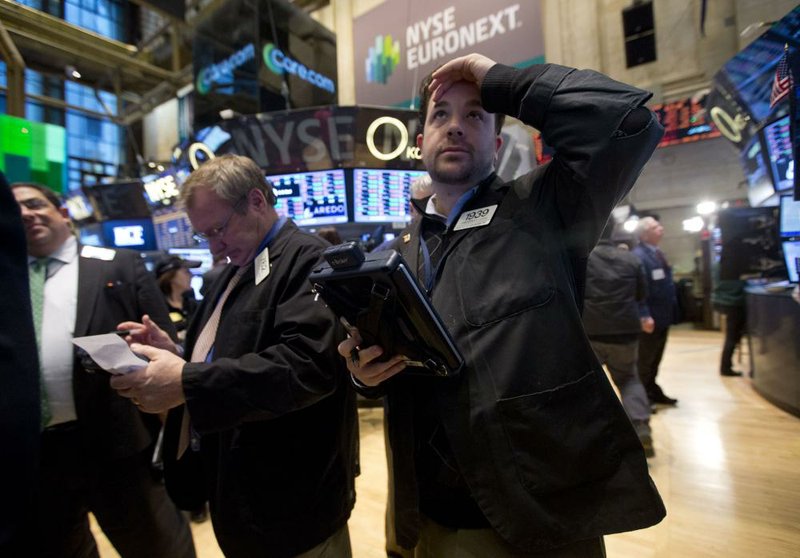Investors worried about slower economic growth in China, a gloomier outlook for U.S. corporate profits and an end to easy money policies in the United States and Europe drove stock prices down Friday.
They’re also fretting over country-specific troubles around the world - such as economic mismanagement in Argentina and political instability in Turkey.
Those fears converged this week to start a two-day rout in global markets.
The Dow dropped 318.24 points, or 2 percent, to 15,879.11 on Friday. It was the blue-chip index’s worst day since last June. The 30-stock gauge fell 3.5 percent this week.
The Standard & Poor’s 500 index fell 38 points, or 2.1 percent, to 1,790 Friday. The Nasdaq composite fell 90 points,or 2.2 percent, to 4,128.
Despite the sell-off, U.S. stocks remain near all-time highs after surging 30 percent last year. The S&P 500 is 3 percent below its record high of 1,848 on Jan. 15.
U.S. stocks have not seen a correction - a drop of 10 percent or more over time - since October 2011.
In Asia on Friday, Japan’s Nikkei 225 slipped 1.9 percent to close at 15,391.56; Hong Kong’s Hang Seng shed 1.2percent to 22,450.06; and Seoul’s Kospi dropped 0.4 percent to 1,940.56.
The turbulence coincides with a global economic shift: China and other emerging market economies appear to be running into trouble just as the developed economies of the United States and Europe finally show signs of renewed strength nearly five years after the end of the recession.
The trouble began Thursday after a January survey showed a drop in Chinese manufacturing activity. Days earlier, China reported that its economic growth last year matched 2012 for the slowest pace since 1999.
“It is interesting how even a mild tremor in China’s growth causes such anxiety around the world,” said Eswar Prasad, professor of trade policy at Cornell University.
Slower growth in China is bad news for countries that supply oil, iron ore and other raw materials to the world’s second-biggest economy. Some of those countries, such as Indonesia and South Africa, were already struggling with an outflow of capital as rising U.S. interest rates drew investors to the United States.
Since the global financial crisis hit in 2008, the Federal Reserve has flooded markets with cash to push interest rates lower and encourage U.S. businesses and consumers to borrow and spend. But last month, as signs of growing economic strength emerged in the U.S., the Fed cut back - reducing its monthly bond purchases to $75 billion from $85 billion. It also said that it expected to reduce the bond buying further “in measured steps” at forthcoming meetings.
The Fed meets again next Tuesday and Wednesday. Many economists expect the central bank to cut the purchases again - perhaps to $65 billion a month.
The scaling back of the Fed’s easy money policies has hit some emerging markets hard. When the Fed was pushing U.S. rates lower, emerging markets had seen an inflow of capital from investors seeking higher returns than they could get in the United States. Now, investment is flowing back to America, hammering currencies in emerging markets.
The South African rand, Russian ruble, Turkish lira and especially the Argentinian peso - which fell 13 percent Thursday - have been “trounced,” said Jane Foley, a currency strategist at Rabobank. “Talk that the U.S. Federal Reserve will announce another reduction in its monthly bond purchases next week … [is also] contributing to a loss of confidence in some emerging markets,” she said.
Since the recession, the global economy has relied heavily on China and other emerging markets as the developed economies of the United States, Europe and Japan struggled.
But China’s economy is decelerating. The economy grew 7.7 percent in October-December 2013 from a year earlier, down from the previous quarter’s 7.8 percent growth, the government reported. Some economists believe the Chinese overestimate growth. Factory output, exports and investment all weakened. On Thursday, the preliminary version of HSBC’s purchasing managers’ index of Chinese manufacturing fell to 49.6, the lowest reading since July’s 47.7. Anything below 50 signals a contraction.
China’s reported growth is still far stronger than the United States, Japan or Europe, but is down from the double-digit rates of the previous decade.
Many economists are troubled less by the slower growth numbers than by China’s over reliance on trade and investment instead of consumer spending.
“China, and the world at large, would benefit from its shift to a lower but more sustainable pattern of growth that is not so heavily dependent on investment-led growth fueled by bank credit,” Prasad said.
It’s early yet in earnings season. Only 123 companies in the Standard & Poor’s 500 index have reported so far. Another 130 report next week.
So far, it’s been a decent season, at least on the surface.
About two-thirds of S&P 500 companies that have reported earnings for last quarter have beaten analysts’ estimates, according to S&P Capital IQ. That is in line with the historical average.
Still, expectations have been falling. As recently as this summer, analysts predicted earnings growth of more than 11 percent for the quarter that companies are reporting now. That prediction has been nearly halved to 5.9 percent.
Information for this article was contributed by Bernard Condon, Toby Sterling and Suzan Fraser of The Associated Press.
Business, Pages 27 on 01/25/2014
